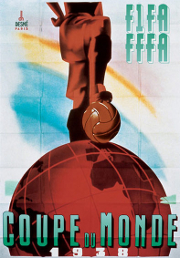Tournament Overview

Held for the second time in a row in Europe, France played host to the third edition of the World Cup in 1938. The decision to hold the tournament in Europe caused the two South American teams that had contested the first final back in 1930 – Uruguay and Argentina – not to enter the tournament, leaving things wide open for European powerhouses Italy, Germany, Hungary and Austria. That was of course until Austria was incorporated into the German Reich some three months before the finals were due to kick off, an event that was to affect the composition of the German squad and ultimately its performance in the tournament.
Austria’s withdrawal left the tournament with fifteen teams, all of which were placed in a straight knock-out round with Sweden the lucky beneficiaries. Including two replays, a total of eighteen games were played – with eighty-four goals being scored at an average of 4.67 per game.
With the destabilised Germany team being unceremoniously bundled out in the first round, holders Italy became the first side to retain the trophy, disposing of hosts France and South American giants Brazil before beating Hungary 4-2 in the final.
Qualifying Campaign and pre-tournament build-up
Germany’s qualifying campaign for the 1938 World Cup was painless, and saw them take three wins out of three in a group containing Finland, Estonia and Sweden during the latter part of 1937. In fact 1937 had proved to be a fantastic year for Sepp Herberger’s charges, seeing them play eleven games – winning ten and drawing one with thirty-six goals scored against six conceded. A stunning 8-0 win in Breslau in May against neighbours Denmark had resulted in the team being dubbed Die Breslauer Elf – “the Breslau eleven” – a side whose skill and grace were epitomised by the quiet and unassuming Otto “Holz” Siffling, who scored five goals.
At the turn of 1938, Herberger’s side had gathered enough momentum to put them among the favourites for the World Cup – that is, of course, until the Nazis decided that the team would be put to better use as a poltical tool. After the annexation of Austria – the Anschluß – of March 1938, moves were quickly made to incorporate a number of Austrian players into the Nationalmannschaft.
The signs were not encouraging, with the new-look Austrian-infused Mannschaft turning out a number of ordinary results during the build-up to the World Cup. The first and last real test before the tournament began providing a dark prelude of things to come: in what soon became an infamous game against England in Berlin – the one where the England team offered the Hitlergruß – Herberger’s side were roundly thrashed 6-3 in front of over a hundred thousand home supporters.
Germany’s Tournament in brief
In football, two plus two never makes five; sometimes, it makes three. This was clearly the case with the German squad of 1938, which flopped miserably despite – or perhaps because of – the inclusion of a number of Austrian players in the side. Although on paper this might have been formula for creating a world-beating unit, the reality was that it saw the breakup of the Breslauer Elf and the incorporation into the side of Austrian players whose hearts were never going to beat with the same passion.
When the tournament began, Herberger’s previously cohesive unit found themselves wracked with internal strife and political interference – factors that were instrumental in their stumbling out of the tournament at the first hurdle after a replay against neighbours Switzerland. On both occasions they had thrown away the lead, and lost the replay 4-2 having led the Swiss 2-0.
Up to and including the most recent edition of the competition in 2010, France 1938 is the only occasion where a German team has failed to win a match or not make it past the first phase of a World Cup finals tournament. It was also to see the first dismissal of a German player from the field of play, when the Austrian Hans Pesser was given his marching orders in the first game against the Swiss.
Germany Tournament Squad List »
Germany Tournament Results and Overview »
